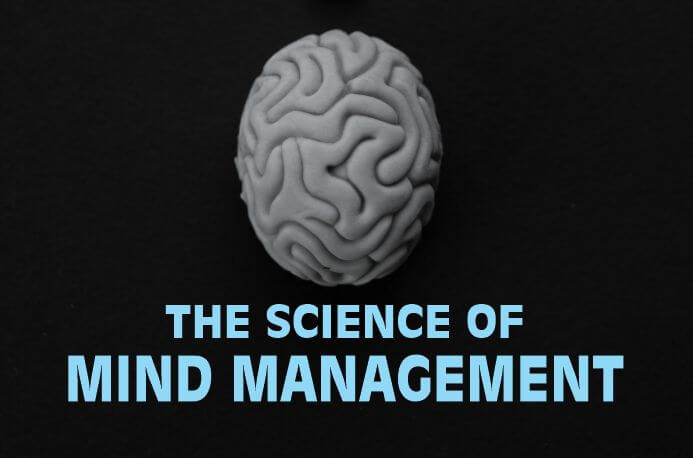The science of mind management is a deep dive into how people can have a grip on their minds and not be swayed, or tossed at the mercy of the straying mind.
When I think about the mind, I think of an iceberg that has just its tip above water with a sturdy, gigantic bulk beneath the surface.
And you can only have a glimpse when you dive in, and the deeper you go, the more astonished you become as to the infinite depth and flexibility of the mind.
However, we might not be expected to dive deep to have control of the little portion of our minds we can see.
In this post, we are going to examine the science of mind management, its history, applications, and controversy surrounding the subject.
What is the science of mind management?

The science of mind management is an emerging field of study that focuses on understanding how the human mind works and how we can effectively manage our thoughts and emotions.
This field draws upon research from various disciplines, including psychology, neuroscience, and cognitive science, to develop evidence-based strategies for improving mental health and well-being.
One of the key insights of the science of mind management is that our thoughts and emotions are closely interconnected.
Our thoughts can influence our emotions, and our emotions can influence our thoughts.
This means that managing our thoughts and emotions is critical for maintaining good mental health.
Related: How to Manage Your Mind
History of the Science of Mind Management
The history of mind management can be traced back to ancient times when various cultures developed practices to manage their thoughts and emotions.
For example, meditation and mindfulness practices have been used in Hinduism and Buddhism for thousands of years as a way to calm the mind and improve mental well-being.
The Science of Mind Management in the 19th Century
In the Western world, the study of psychology and the human mind began to gain prominence in the late 19th and early 20th centuries.
Early pioneers in the field of psychology, such as Sigmund Freud and Carl Jung, developed theories of psychoanalysis and depth psychology, which aimed to uncover the unconscious thoughts and emotions that underlie human behavior.
During World War II, the U.S. military began to take an interest in the study of human behavior and mental health.
The military recognized the importance of managing the mental health of soldiers, and the field of military psychology emerged as a result.
Military psychologists developed techniques for training soldiers to manage stress and cope with trauma, such as exposure therapy and cognitive-behavioral therapy.
In the 1960s and 1970s, the self-help movement emerged, emphasizing personal growth and development through practices such as meditation, visualization, and positive affirmations.
This movement popularized the idea of mind management as a way to improve mental health and well-being.
More recently, advances in neuroscience and brain imaging have provided new insights into the workings of the human mind.
The Science of Mind Management in Recent Times
Research has shown that the brain is a plastic organ that can change and adapt throughout our lives, and that practices such as meditation can influence the structure and function of the brain in positive ways.
Today, mind management is a growing field of study that draws upon research from psychology, neuroscience, and other disciplines to develop evidence-based strategies for improving mental health and well-being.
Techniques such as meditation, mindfulness, cognitive-behavioral therapy, and positive psychology are widely used to help people manage their thoughts and emotions, leading to a healthier and more fulfilling life.
Applications of Mind Management
Mind management techniques have become increasingly popular in recent years as a way to improve mental health, well-being, and overall quality of life.
These techniques have a wide range of applications, from personal development to clinical therapy, workplace productivity and performance, and education and learning.
Here are some of the key applications of mind management and how they can help us to live happier, healthier, and more fulfilling lives.
- Personal Development: One of the most common applications of mind management is personal development. Mind management techniques, such as meditation and mindfulness, can help us to develop a greater sense of self-awareness, regulate our emotions, and cultivate a more positive mindset. By learning to manage our thoughts and feelings, we can improve our relationships with ourselves and others, increase our resilience, and achieve greater levels of success and fulfillment in our personal and professional lives.
- Clinical Therapy: Mind management techniques are also used in clinical therapy to treat a range of mental health conditions, including anxiety, depression, and post-traumatic stress disorder (PTSD). Cognitive-behavioral therapy (CBT) is one of the most commonly used mind management techniques in clinical practice, and it has been shown to be effective in reducing symptoms of depression and anxiety. Other mind management techniques, such as mindfulness-based stress reduction (MBSR), have also been shown to be effective in reducing symptoms of anxiety and depression and improving overall well-being.
Related: Mental Health 101
- Workplace Productivity and Performance: Mind management techniques can also be used to improve workplace productivity and performance. Practices such as mindfulness meditation can help employees to reduce stress, increase focus, and improve decision-making skills. Research has shown that employees who practice mindfulness meditation are more productive, creative, and engaged at work, and they experience less burnout and job dissatisfaction.
- Education and Learning: Mind management techniques can also be applied in education and learning contexts. Studies have shown that mindfulness practices can help students to improve their attention, memory, and learning outcomes. Mindfulness-based interventions have also been used to help students with attention deficit hyperactivity disorder (ADHD) to improve their academic performance and social skills.
Controversies Surrounding the Science of Mind Management
While the concept of mind management has gained widespread acceptance as an effective way to improve mental health and well-being, there are also some controversies surrounding it. Some of the main controversies surrounding mind management include:
- Effectiveness: While there is a growing body of research supporting the effectiveness of mind management techniques, there is also some debate over their efficacy. Some researchers have argued that the benefits of practices such as meditation and mindfulness are overstated and that more rigorous scientific studies are needed to evaluate their effectiveness.
- Cultural Appropriation: Mind management practices, such as meditation and yoga, have their roots in Eastern spiritual traditions. Some people argue that the adoption of these practices by Western cultures represents a form of cultural appropriation and that they are being stripped of their spiritual and cultural significance.
- Commercialization: Mind management practices have become increasingly commercialized in recent years, with a growing number of books, apps, and courses available for purchase. Some critics argue that this commercialization has led to a commodification of mindfulness and meditation, reducing them to consumer products rather than meaningful spiritual practices.
- Potential Harm: While mind management practices are generally considered safe and beneficial, there is also the potential for harm. For example, some people may experience negative side effects from meditation, such as increased anxiety or depression. It is important to approach mind management practices with caution and to seek guidance from a qualified practitioner if necessary.
- Individual Responsibility: Some critics argue that the emphasis on mind management places too much responsibility on individuals to manage their own mental health and well-being.
- They argue that social and economic factors, such as poverty, discrimination, and inequality, play a significant role in mental health outcomes and that addressing these issues should be a higher priority than individual self-improvement.
Conclusion
In conclusion, the science of mind management is an exciting and rapidly growing field that offers insights and strategies for improving mental health and well-being.
By drawing upon research from psychology, neuroscience, and other disciplines, we can develop evidence-based techniques for managing our thoughts and emotions, leading to a healthier, happier life.
While mind management is a promising field with many potential benefits, it is also important to recognize and address the controversies and potential risks associated with these practices.
By taking a thoughtful and nuanced approach, we can maximize the benefits of mind management while minimizing any potential harm or negative impacts.
REFERENCE:
- Top strategies on how to control your mind
- 5 Strategies to Control Your Thoughts and Your Mind
- 7 Ways to Take Control of Your Mind
Pious Clements is the insightful voice behind "The Conducts of Life" blog, where he writes about life ethics, self-development, life mastery, and the dynamics of people and society.
With a profound understanding of human behaviuor and societal dynamics, Pious offers thought-provoking perspectives on ethical living and personal growth.
Through engaging narratives and astute observations, he inspires readers to navigate life's complexities with wisdom and integrity, encouraging a deeper understanding of the human experience and our place within society.
